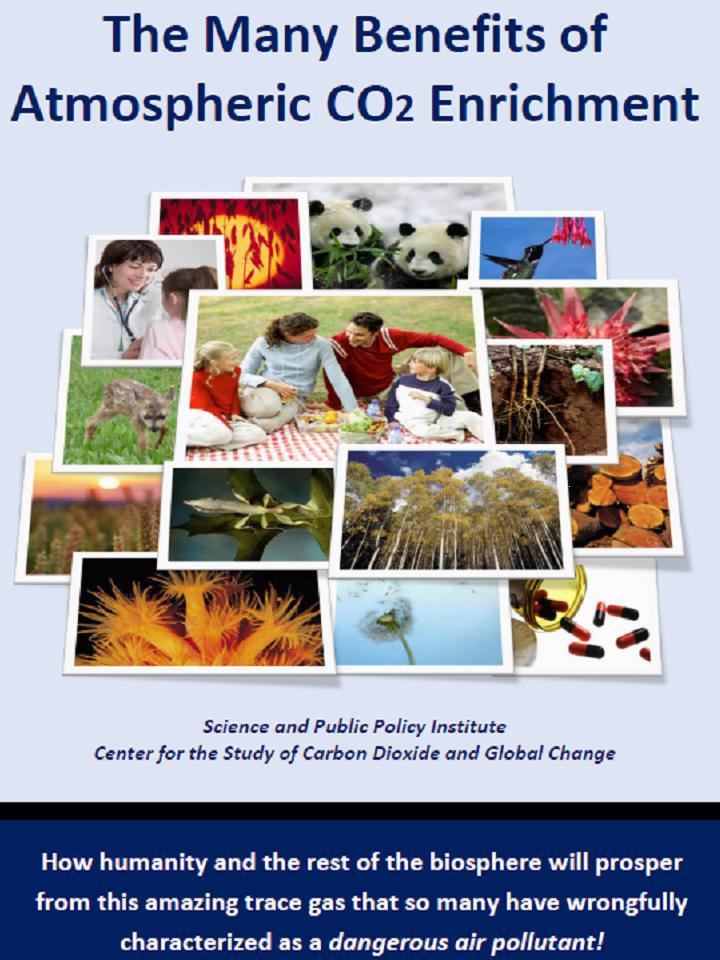Well, it looks like the climate change skeptics are starting to hedge their bets. Global climate is not changing. But if it does change, it’ll change for the better. At least that’s the gist of a book by the Center for the Study of Carbon Dioxide and Global Change entitled “The Many Benefits of Atmospheric CO2 Enrichment”. The book documents 55 different ways that increasing global CO2 will benefit the world. Most of this is built on studies documenting increases in plant growth and/or photosynthesis associated with increasing CO2. If you’re interested you can look at a preview of the book at:
http://www.co2science.org/education/book/2011/55BenefitsofCO2Pamphlet.pdf

While CO2 enrichment can benefit plants and trees in the short term, it’s less clear how they will respond over the long term. For example, nutrition or water may soon become limiting such that the full CO2 ‘fertilization’ effect is never realized. Also, it’s likely that certain plants will benefit more from increased CO2 than others: Will exotic invasives gain an additional advantage over natives? And, of course, if rising CO2 results in increased global temps (which the Center denies) then all bets are off.
You can learn more about the Center for the Study of Carbon Dioxide and Global Change at their website http://www.co2science.org/ There is a tab on the homepage where you can donate to support their cause. Why not? Exxon/Mobil already has.
There was a study I remember reading about last year some time that was quite interesting. It looked further into the biological changes plants undergo in higher CO2 environments. The study found that grains grown in higher CO2 environments ended up producing less protein, in some cases by as much as 20% less. The study also concluded that plants in higher CO2 environments also produced more protective compounds, such a phenols, making them less palatable to animals (including humans). The study suggested the reason for this was that a higher concentration of atmospheric CO2 meant that the plants needed to produce less RuBisCO, which is the protein synthesised by plants that plays a central roll in fixing CO2 and converting it into sugars (if I remember my biology rightly). Plants producing less RuBisCO had more energy to put into producing protective compounds, such as phenols, making them less palatable.
It’s a double edged sword when you think about it. The study did find accelerated growth rates in plants, but less nutritious fruiting bodies and higher levels of toxins to boot. The implications for human consumption of crops is obvious, but animals too would be affected. Koalas here down under only eat eucalyptus leaves, which are high in lignin and not very nutritious. Consequently they have to eat a lot of them and take a long time to digest them. Might we see the decline of species of animals similar to koalas in the future, in that their diets are on a nutritional knife-edge already? Might a future in which higher atmospheric CO2 is the norm see animal agriculture using even more resources than it does already, as the nutrition in animal feed takes a dive? They’re interesting questions to think about. There’s probably a PhD in there somewhere!
Here’s a link to one of the studies I was referring to. The researcher also did a study on Cassava with similar conclusions, but I’m unable to find a link for it.
Photosynthesis and defence .
Seems I was mistaken about the phenols though.
Out of curiosity, who posted this? It does not have a byline.
I just read it — it is so full of half-truths as to be useless — and yet strangely amusing.
Oh, I get it. It isn’t “global warming” or “climate change.” We are experiencing “atmospheric enhancement.”
Well, then I say, bring on the CO2!
Sorry — “enrichment.” Whatever it is, we’d be crazy to fight against it.
I like “enhancement” as it sounds kind of naughty.
“Will exotic invasives gain an additional advantage over natives?”
or perhaps worse, make some obnoxious natives even more obnoxious:
http://www.pnas.org/content/103/24/9086.abstract
Nice for the plants (for a while)–not so nice for the rest of us (unless you’re a rock maybe).